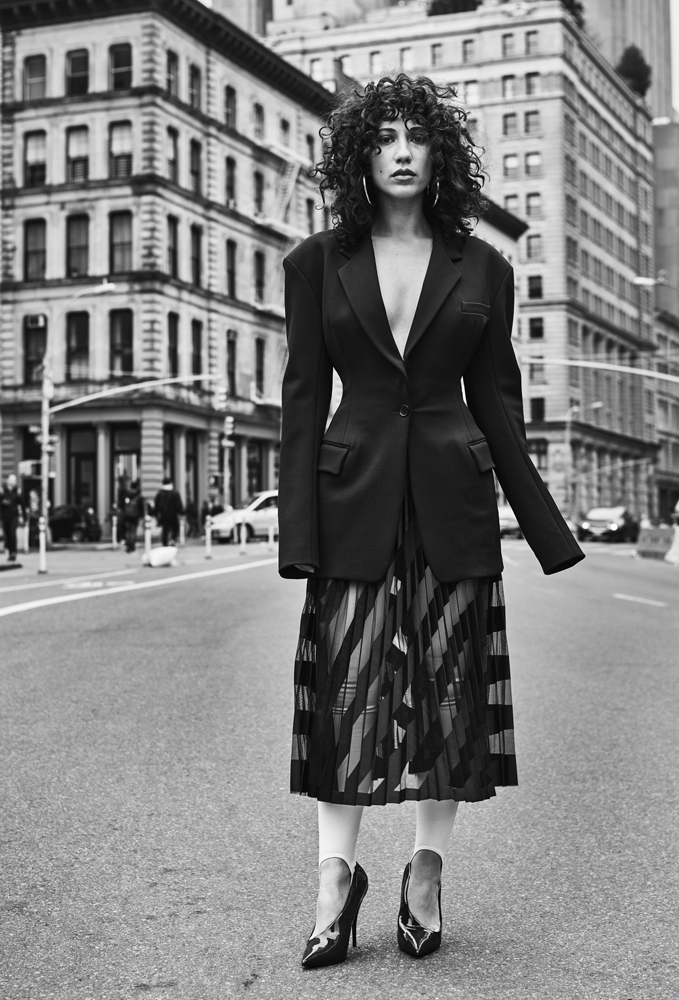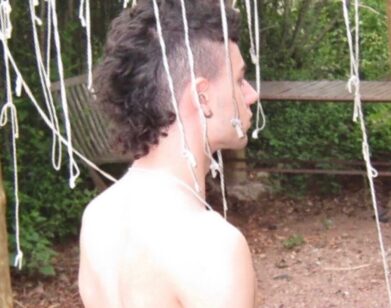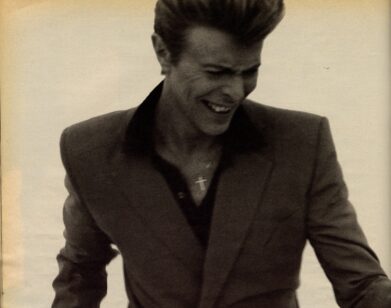Tei Shi
TEI SHI IN NEW YORK AT THE ROXY HOTEL, MARCH 2017. PHOTOS: DAVID NEELEMAN/JONES MANAGEMENT. STYLING: SAVANNAH WHITE. HAIR: CHARLIE TAYLOR FOR TRACEY MATTINGLY. MAKEUP: SUZY GERSTEIN FOR HONEY ARTISTS USING VISEART. PHOTO ASSISTANTS: JUAN CARLOS ZORRILLA AND JASON ZEREN. STYLING ASSISTANT: TROY ALLEN. RETOUCHING: FEATHER CREATIVE.
Tei Shi’s debut full-length record is a self-excavation, an unearthing of former identities in the hope of transforming her current one. Titled Crawl Space (Downtown/Interscope) and released last week, it begins with a childhood recording of Tei Shi, born Valerie Teicher, and her father. He speaks softly to her in Spanish, teaching her to record herself on cassette; her young voice changes from questioning to assured, and proclaims into a microphone, “This is the way to record.” (On track six, she also soberly tells the listener, “I’m a bad singer. I can’t do anything well. … I just hope one day, I can be like Britney Spears.“) What follows is further digging, less literal and more emotional: a collection of genre-bending songs that ranges from celebratory to regretful, in which Tei Shi touches upon the passing of time, what one deserves from a lover, forming your identity through others, and more.
“It brings you back to this grounded place of acknowledging yourself for what you really are when you see your thoughts and tendencies as a kid,” says Tei Shi of revisiting her old journals (she has a suitcase full) and vintage recordings of herself. “It’s this ritualistic thing; almost every time I go home, which is maybe once or twice a year, I go through them and find something I hadn’t seen before.” The 27-year-old has seen many iterations of herself pass by: born in Argentina, she moved frequently throughout her youth, first to Colombia, then Canada, and to Colombia once more; she describes herself as one of those teenagers that was “really into school;” and studied psychology at McGill University for a year before choosing to attend Berklee College of Music on a full scholarship. Since graduating in 2013, she released two EPs and moved to New York, where she makes music full-time. When we recently spoke to the artist by phone, she reflected on these seemingly constant mutations, and explained that releasing this album was a process of “rediscovery,” in which she recovered a passion that existed since she recorded those cassettes.
HALEY WEISS: Did you rediscover the cassette recordings during the process of making the album? How did they become a part of it?
TEI SHI: Yes. I kind of forgot about all of those tapes, because it was this short phase—I think I must’ve been nine or 10—and my sister gave me her old boom box and showed me how to use the tape recorder, and I would sit there and record myself singing and talking and all that. I came across one of them three or four years ago, and at that time, I remember listening to it and thinking, “I want to do something with this for my first album or for when I do something full-length. I want to use this somehow.” So I always had it in the back of my mind, and when I was halfway through making this album, I went back home and I dug up a few other ones that I had found in boxes. I went through them all and grabbed the pieces that I felt resonated the most, and worked them into the album.
WEISS: Did any of the recordings surprise you or strike you as odd?
TEI SHI: Yes. A lot of them, when I first heard them, were surprising or struck me a bit like, “Really? I thought that?” or, “I felt that?” But then made sense, because I quickly remembered what I was like when I was a kid and how I felt. I feel like I was very emotional and very dramatic as a kid, and when I would record myself, I was almost testing out different characters or different voices, so a lot of it maybe was me leaning into it a bit. [laughs] One of the things that was really cool listening back on those was rediscovering how passionate I had felt when I was young about being a singer and being a performer, and how much I wanted that, and how deeply that was a part of me when I was little. I think I forgot about that, because I feel like I lost that at some point in my life, and then regained it when I started making my music and putting music out there, but in a different way. So it was cool to go back and remember that: that I’m doing now what I really dreamed of doing when I was young—obviously in a different way. And then certain things like the Britney Spears thing are hilarious, because obviously I’m not Britney Spears and that’s not my career goal now. [laughs] But I feel like it really marks a place in time, and actually a lot of the emotions that are tracked in those three little snippets on the album are things that I still feel sometimes: the self-doubt, beating yourself up about things, gaining confidence, and quickly losing it. I think there’s that tracked in those in a really innocent way that still is super relevant to me now and to a lot of people.
WEISS: The start of the album is interesting tonally, because you go from that recording of you when you were young to the first lyrics of “Keep Running,” which are, “Every time I look over my shoulder / I’m getting older.” What was the decision-making process like to lead with that song? It strikes me as a bit sorrowful but also accepting and looking forward; it seems to encompass a lot of emotions.
TEI SHI: I had a really hard time, or not a hard time, but it took me a while to figure out the tracklist and the flow of the album. I spent a lot of time messing around with that, and figuring out how to incorporate the tape recordings. But I really wanted to open it with the “Way to Record” recording, because I felt like it was really cool to juxtapose that really innocent, really “core me” version learning how to record myself on a cassette tape with my dad explaining it to me, and follow that with my first album that I learnt a lot about how to record [in making it]. Then “Keep Running,” it was the first song that I wrote for the album, and it was the first thing that I felt. I think I wrote that right after I put out my second EP, so it was a while back. But I remember that was the first thing after that EP that I wrote where I was like, “Okay, this is for the album.” And that was the beginning of me starting to think about the album, and I knew from that moment that I wanted it to be the first single. It made sense to me to have it open the album especially, like you said, coming out of that recording at the beginning and setting that tone of not necessarily nostalgia, but tying things back to the essence of me, and this part of me that maybe I lost and rediscovered. I feel like that song talks about that, about time, and the fleetingness of things.
WEISS: Going from your first EP to the second, you said that for the second you went to a happier place of songwriting and that was reflected in the songs. How did you feel when you entered this album, in terms of your mindset?
TEI SHI: I think it was a mix of a lot of things, because the album, in contrast to the way I made the EPs, it spanned such a long time. The two EPs, they really marked this specific moment for me, because I made each of those in less than a month. The album I was working on for a year and a half or more. There was a lot of stuff that I was feeling, and ups and downs, and different inspirations, or different influences. But I do think the album went back into a darker place, not necessarily dark or sad, but a little more introspective than some of the last EP. With the last EP, what I brought into that that I didn’t have before was having experienced playing live and doing live shows, and that made me want to bring in some more playful, happy stuff that would be more fun and dynamic to play live. I wanted to have more live instrumentation, and I wanted it to be less electronic, and sprawl across a bigger range of music.
After the second EP, there was a lot that I went through where I felt like I was outgrowing the things that I had around me up until that EP. I felt like I was being a little held down or held back by some of the relationships I had in my life and some of the surroundings and the environment I put myself in, and I really wanted to get myself out of that space. The album itself talks about those feelings but it’s also the vessel through which I got myself out of that place. It’s allowed me to acknowledge a lot of the things that I was feeling and then make decisions to change those things, and by the end of the album, I definitely felt like I was much happier and in a better place, so it was weirdly like the album was the coping mechanism but also the content of all of these feelings. A lot of it does come from a heavier place, a place of more self-reflection, and more struggle or unhappiness, but also there’s a big part of it that’s a motivation for myself. There are some songs that are these little personal anthems for me to keep going. The song “Crawl,” for example, was like that. It came at a point when I was writing the album where I felt like I needed to remind myself that what I’m doing now is just the beginning and a part of a bigger thing. It was a self-motivating song. Even “Keep Running,” I think there are positives and a hopeful message behind it.
WEISS: You at one point said that you never wanted to be a singer, right? You wanted to be a songwriter?
TEI SHI: Well, I definitely did want to be a singer, but I felt more passionate about the creative process, like writing and recording, and creating more so than just being the voice of something. I love singing, and I’ve realized that is my strength and in a lot of ways my primary thing, but when I first started putting music out I was afraid that if I presented myself as a singer, people would assume that I don’t write my own songs and that I don’t have this creative control. I think there is a misconception that when people are the face of something, or they’re the voice, especially when they’re young women, that they’re being created or molded by someone else. I think more so than not wanting to be a singer I was afraid of being mislabeled as just a singer—not that that’s a bad thing. It was more of that insecurity, but through putting out the first EPs and going into this album, that was one of the main things that I changed in my outlook: actually I am a singer, and I want to put my voice out there as clearly as possible, and I want to use it more, and I want to be more adventurous with it. At this point, I know what I do, and people are going to perceive me however they want. I shed a lot of that hesitation that I used to have.
WEISS: You’ve talked about how all of the moving you did in your life required adapting to these various environments and informed your personality. In what ways, if any, do you see that ability to adapt in your music?
TEI SHI: One of the main things that I want to do with my music and with my voice is be able to create a distinct enough identity that I can use it in a variety of different contexts, different genres, and different projects. My overall creative goal is to be able to not be one thing or another, and not be labeled as indie pop or indie electronic or R&B or whatever, and create the ability to do drastically different stuff if I wanted to and have it still make sense. That idea of being a chameleon is how I’ve lived my life on a personal level, but it also translates into how I want to be as an artist. It definitely ties together. That was one of the things I wanted to do with the album, too, to have a big range of stuff and not have it feel like necessarily every song fits in with the next, but have it feel cohesive because of the voice.
WEISS: Lastly, you talked earlier about how part of this process was rediscovering that old version of yourself that loved music and performance, which you had lost for some time. Now that you’ve rediscovered that, how do you keep hold of it? What keeps you in touch with that feeling?
TEI SHI: I don’t know. I think that’s the constant struggle with working on something for so long, and then having to keep standing behind it. That’s one of the things with a full-length that I hadn’t really experienced before that’s kind of crazy, and people develop different ways of keeping themselves motivated or keeping themselves excited about things. I don’t really know yet, but I feel the happiest when I’m creating new ideas and have things that I’m working on, so I think the way to stay happy and motivated in that sense is already having the next thing in mind or just continuing to come up with new things. That is probably, for me, the thing that keeps me the most fulfilled.
CRAWL SPACE (DOWNTOWN/INTERSCOPE) IS OUT NOW. FOR MORE ON TEI SHI, VISIT HER WEBSITE.







